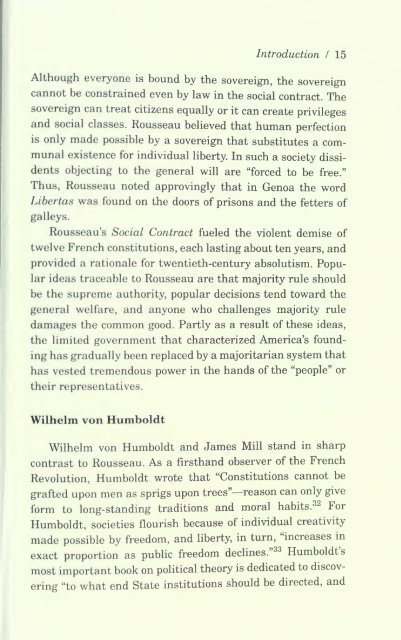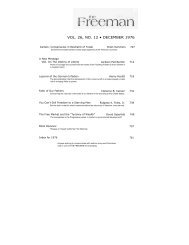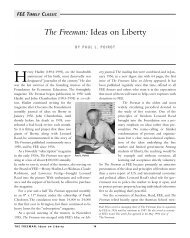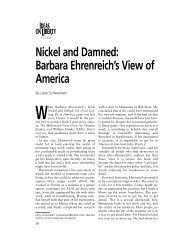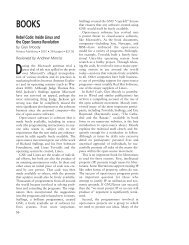Is Politics Insoluble?
Is Politics Insoluble?
Is Politics Insoluble?
Create successful ePaper yourself
Turn your PDF publications into a flip-book with our unique Google optimized e-Paper software.
Introduction / 15<br />
Although everyone is bound by the sovereign, the sovereign<br />
cannot be constrained even by law in the social contract. The<br />
sovereign can treat citizens equally or it can create privileges<br />
and social classes. Rousseau believed that human perfection<br />
is only made possible by a sovereign that substitutes a com-<br />
munal existence for individual liberty. In such a society dissi-<br />
dents objecting to the general will are "forced to be free."<br />
Thus, Rousseau noted approvingly that in Genoa the word<br />
Libertas was found on the doors of prisons and the fetters of<br />
galleys.<br />
Rousseau's Social Contract fueled the violent demise of<br />
twelve French constitutions, each lasting about ten years, and<br />
provided a rationale for twentieth-century absolutism. Popu-<br />
lar ideas traceable to Rousseau are that majority rule should<br />
be the supreme authority, popular decisions tend toward the<br />
general welfare, and anyone who challenges majority rule<br />
damages the common good. Partly as a result of these ideas,<br />
the limited government that characterized America's found-<br />
ing has gradually been replaced by a majoritarian system that<br />
has vested tremendous power in the hands of the "people" or<br />
their representatives.<br />
Wilhelm von Humboldt<br />
Wilhelm von Humboldt and James Mill stand in sharp<br />
contrast to Rousseau. As a firsthand observer of the French<br />
Revolution, Humboldt wrote that "Constitutions cannot be<br />
grafted upon men as sprigs upon trees"—reason can only give<br />
form to long-standing traditions and moral habits.^^ Yot<br />
Humboldt, societies flourish because of individual creativity<br />
made possible by freedom, and liberty in turn, "increases in<br />
exact proportion as public freedom declines."^^ Humboldt's<br />
most important book on political theory is dedicated to discov-<br />
ering "to what end State institutions should be directed, and


